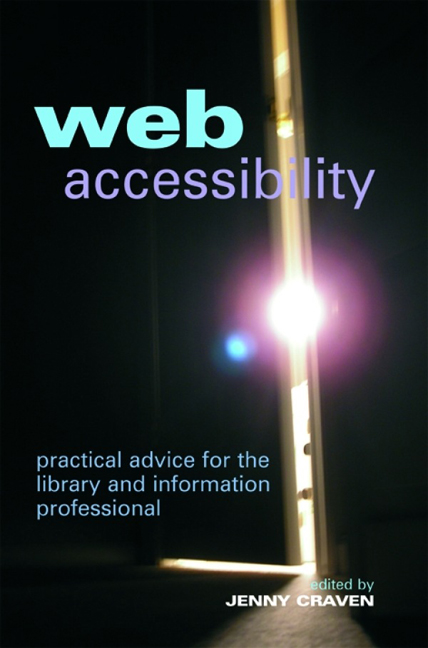Book contents
- Frontmatter
- Contents
- Contributors
- 1 Introduction
- 2 Tools used for widening access to the web
- 3 Design for All – how web accessibility affects different people
- 4 The importance of web accessibility
- 5 Accessibility advice and guidance
- 6 Accessibility evaluation and assessment
- 7 Issues for library and information services
- 8 Design for All in the library and information science curriculum
- 9 Best practice examples of web accessibility
- 10 Web accessibility in the future
- Index
5 - Accessibility advice and guidance
Published online by Cambridge University Press: 08 June 2018
- Frontmatter
- Contents
- Contributors
- 1 Introduction
- 2 Tools used for widening access to the web
- 3 Design for All – how web accessibility affects different people
- 4 The importance of web accessibility
- 5 Accessibility advice and guidance
- 6 Accessibility evaluation and assessment
- 7 Issues for library and information services
- 8 Design for All in the library and information science curriculum
- 9 Best practice examples of web accessibility
- 10 Web accessibility in the future
- Index
Summary
Introduction
Web developers and website owners have been confused by the apparent array of web accessibility guidelines available on the web. Those web developers who have received formal training in web design and development may have touched upon accessibility only briefly during their studies, if at all. Website owners may have heard about the importance of web accessibility through the media or may have been informed by their legal, human resources or strategy departments that their organization is now subject to a legal duty to provide web-based services that disabled people can use.
Awareness in the public and private sectors
Civil servants who work in the public sector are likely to know more about accessibility, as there has been greater responsibility placed upon them by way of legislation to ensure that all citizens can access their web-based services. At the other extreme, small businesses are perhaps less likely either to be aware of the importance of accessibility or to have created sites that are usable by disabled people (owing to lack of appropriate resources).
Those information professionals working in the public sector are therefore most likely to be aware of the need to ensure that their organiz - ation's website is accessible. Those working in medium-to-large private companies will probably be aware that they have a legal duty, although they may be unsure of how this duty might be met. Those working in small businesses and voluntary organizations (apart from those directly connected with disability issues) are least exposed to the messages about accessible web design, and are therefore likely to be the most in need of help (of course, there are exceptions).
The information professional's responsibility
It may be argued that information professionals have a responsibility within their organization to ensure that information about the importance of web accessibility reaches both those with management responsibility for the organization's website and those directly responsible for the technical construction and editorial content of the site. The Disability Discrim - ination Act 1995 (DDA, 1995) places a legal duty on employers to ensure that employees are not subject to disability discrimination. A corporate website that cannot be used by a company's own disabled employees may be in breach of the DDA.
- Type
- Chapter
- Information
- Web AccessibilityPractical Advice for the Library and Information Professional, pp. 57 - 72Publisher: FacetPrint publication year: 2008
- 1
- Cited by



